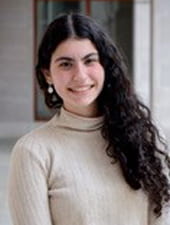Each year, the Department of Biology in Arts & Sciences at Washington University in St. Louis awards a prize to a graduating senior in memory of Marion Smith Spector, a 1938 graduate who studied zoology under the late Viktor Hamburger. The Spector Prize, first awarded in 1974, recognizes academic excellence and outstanding undergraduate achievement in research. Students are nominated by their research mentors for outstanding research that has made substantial contributions to a field.
This year, there are two winners from the School of Arts & Sciences at Washington University in St. Louis: Larissa Rays Wahba, a senior majoring in Neuroscience and Latin American Studies, and Xiyun Zhang, a senior majoring in Neuroscience and Psychological and Brain Sciences.
Rays Wahba completed research in the Herzog Lab. Her thesis Seasonal Adaptation of Circadian Behaviors explores how mice adapt to seasonal changes in photoperiod.
In his nomination letter, Viktor Hamburger Distinguished Professor Erik Herzog wrote: “Lari’s enthusiasm for learning is contagious. She seeks opportunities to learn and often help others without hesitation. I recognize the high bar we set in Biology for the Spector and Quatrano Prizes. Of the 65 undergraduates who have done independent research in my lab over the past 23 years, Lari is among the very best and most accomplished, exceptionally worthy of this recognition.”

Rays Wahba says “Writing my senior thesis was a challenge, yet an extremely rewarding one. The experience allowed me to pull together knowledge from my undergraduate courses and skills I had learned in the Herzog Lab for the past three years. I am so grateful for Drs. Erik Herzog and Nikhil Lokesh for their support during this process. They taught me how to be excited about research – even during tough times – by always pushing me to think about the story I wanted to tell with my work. Overall, doing research as an undergraduate taught me to go beyond what was in front of me and to critically analyze and understand my data. I gained invaluable skills that I hope to apply as I continue doing research, and mentors whose lessons and support I will carry on for a long time to come!”

Zhang completed research in the Gabel Lab. Her thesis Investigating Overgrowth and Obesity in Tatton-Brown Rahman Syndrome with Mouse Models of Diverse Dnmt3a Mutations investigates a neurodevelopmental disorder characterized by overgrowth and intellectual disability.
In his nomination letter, Associate Professor Harrison Gabel wrote: “Xiyun is an extremely promising and talented scientist, who has displayed the highest quality of research and substantial intellectual contributions in her thesis work.
“She has been integral in multiple research projects in my lab and has uncovered critical insights for her topic and the field. Xiyun’s successful work on these projects illustrates her work ethic, carefulness, and intellect. Importantly, she has taken on ownership and agency in this and other projects, understanding the scientific rationale and experimental design for each study as she implements it. This work demonstrates Xiyun’s high level of independent thinking and maturity as a researcher. Her thesis demonstrates the high quality of her science, data, analysis, and presentation, through both her collaborative work and her independent work. I can think of no student more deserving of this award.”
Zhang says “I feel extremely honored to receive this prize. I wish to express my immense gratitude towards my research mentors, professor Harrison Gabel and Dr. Diana Beard, and everyone in my thesis lab, for their genuine support and guidance: I could never have gone this far without them. It was truly a wonderful experience to learn and work along with this collaborative and brilliant team of scientists who have nurtured me with their love and passion for scientific inquiries, and I will carry on this love and passion in my future endeavors.”
The awardees will present their research at a special seminar, and receive a prize and formal acknowledgement at a celebration of biology honors and research emphasis students in May.